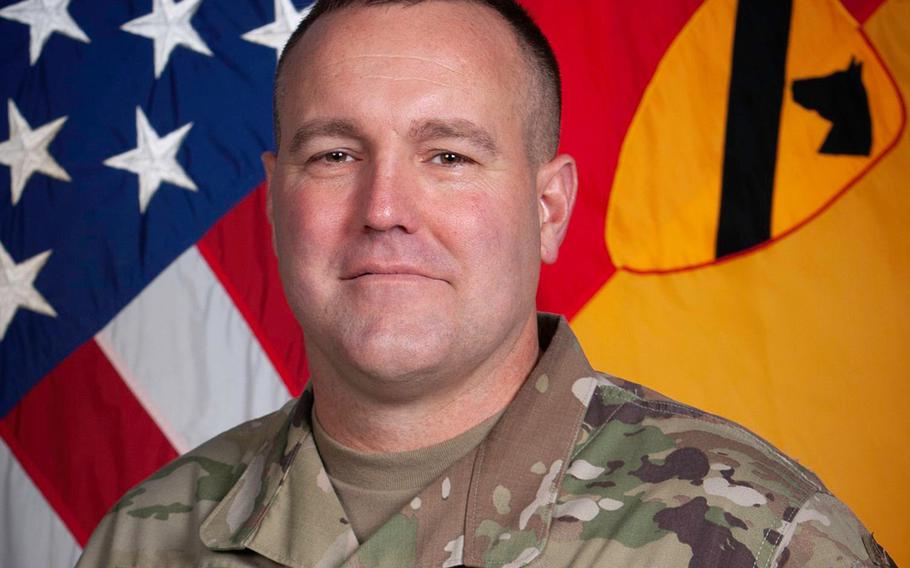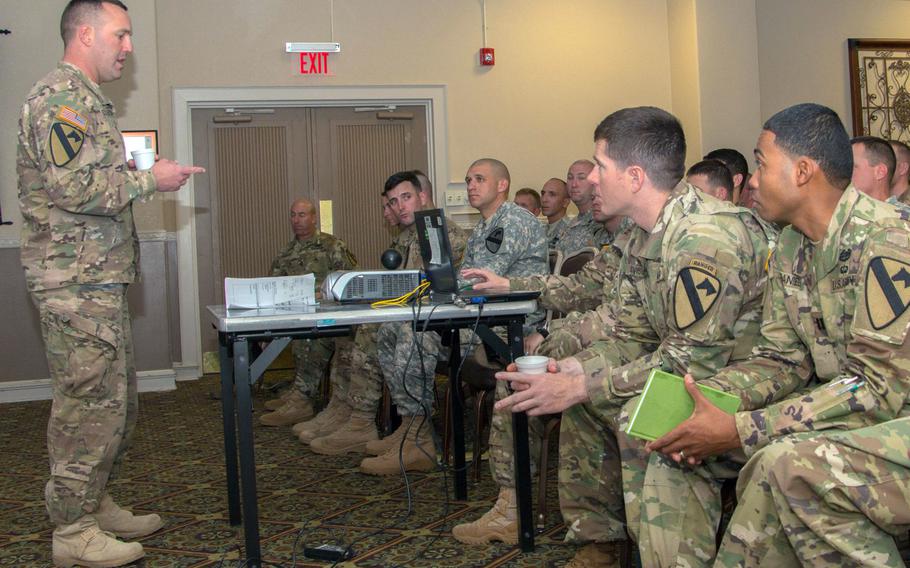
Col. Michael Schoenfeldt, 1st Armored Brigade Combat Team, 1st Cavalry Division commander, was relieved of command for health reasons while on rotation to Europe. The Fort Hood, Texas-based division is investigating allegations against Schoenfeldt of toxic leadership and violating coronavirus quarantine rules. (U.S. Army)
Stars and Stripes is making stories on the coronavirus pandemic available free of charge. See more staff and wire stories here. Sign up for our daily coronavirus newsletter here. Please support our journalism with a subscription.
STUTTGART, Germany — A Fort Hood brigade commander is under investigation after allegations of toxic leadership and violating coronavirus quarantine rules, even as hundreds of his troops contracted the illness soon after his unit’s arrival in Germany for a nine-month mission.
Col. Michael Schoenfeldt led the 1st Armored Brigade, 1st Cavalry Division, until he departed Germany for Texas in February because of unspecified health reasons, division officials said. He now faces numerous allegations by subordinate officers related to what they described as a bullying leadership style.
“Our command takes these allegations very seriously. We have ongoing investigations into the alleged incidents,” Lt. Col. Chris Brautigam, spokesman for the 1st Cavalry Division, said in a recent statement.
The allegations are the latest leveled at a unit from the Texas base, where the killing of Spc. Vanessa Guillen last year sparked an independent investigation that found a pervasive climate of abuse and sexual harassment, leading to the firings of at least 14 Army senior leaders by December.
Soldiers in the 1st Armored Brigade, which began arriving in Germany in November, said the toxic climate in their unit continued well after the findings of widespread dysfunction were reported to Congress.
“This is the worst I’ve been treated. That’s the bottom line,” said one brigade officer under condition of anonymity for fear of retaliation. “I’ve dealt with some hard leaders before, but this was toxic through and through.”
The Army’s independent review of command culture failures at Fort Hood found that the 1st Armored Brigade “merits special mention” for high numbers of enlisted personnel who reported they would fear retaliation if they were to report a sexual assault. The report also faulted the brigade for “dismal” knowledge about sexual assault reporting protocols.
“If I received this sort of data as brigade commander, I would have done something with it. But when the Fort Hood report dropped, we didn’t talk about it at all after that,” said the brigade officer, who was one of three officers who detailed the allegations. “No retraining, no ‘How do we attack the problem? How do we build confidence in the esprit de corps of the unit?’ Nothing like that.”
Despite problems outlined in the Fort Hood report and other investigations underway, Schoenfeldt has not been suspended or relieved, the Army said.
“Rather, because his departure due to health reasons affected his ability to complete various administrative actions and exercise the authority normally designated for commanders, he has been determined to be unavailable and unable to perform duties as the Brigade commander,” Brautigam said.
Schoenfeldt continues to receive treatment for the medical condition that required him to redeploy, Brautigam said.
His return to Europe, “like any Trooper, is contingent upon the successful completion of treatment, clearance from medical professionals to return and a consideration of the unit’s operational timeline in Europe,” Brautigam said, adding that the colonel is assigned to the unit’s home station mission command element.
Schoenfeldt, an armored officer with nearly 23 years of service, declined to comment on the allegations because the investigation is ongoing, Brautigam said.
But the officers who reported to Schoenfeldt said there needs to be accountability for a commander they said routinely subjected his staff to profanity-laced outbursts in meetings where leaders were singled out in front of peers and junior officers.
The 1st Cavalry Division also is investigating allegations that Schoenfeldt used unusual nicknames for subordinates and whether he directed them toward minority troops.
For example, a Black major was called “Left Eye” from the contemporary R&B group TLC, for “chasing waterfalls” — ideas that Schoenfeldt thought were unrealistic, officers said.
A Hispanic female soldier was referred to as “Honey Jack” during meetings, three officers said.
“When I heard that, I looked at her expression, and she looked uncomfortable, but was willing go along with it,” a brigade officer said.
Added another officer in the meeting: “He didn’t address a white male officer with those sorts of nicknames. You could clearly see people were uncomfortable with those statements. It was belittling.”

Then-Lt. Col. Michael Schoenfeldt, commander, 2nd Battalion, 5th Cavalry Regiment, 1st Armored Brigade Combat Team, 1st Cavalry Division, leads a discussion on hazing during the 1st ABCT Sexual Harassment/Assault Response Prevention conference at Club Hood, Texas in 2016. Schoenfeldt is under investigation after allegations of toxic leadership and violating coronavirus quarantine rules while commander of the brigade. (Sgt. Christopher Dennis)
The division’s probe also is examining accusations that Schoenfeldt flouted rules intended to stem the spread of the coronavirus, which spread rampantly in the brigade after it came to Grafenwoehr, Germany.
Upon arrival, soldiers were required to quarantine and restrict their movements to a designated camp at the Army’s largest training ground in Europe to prevent the spread of the virus, per U.S. Army Europe and Africa rules.
But three brigade officers said Schoenfeldt didn’t join the rest of the unit at the camp, opting to stay in a garrison hotel instead, while making trips in and out of the restriction-of-movement area.
“He stayed in the hotel and not with the rest of the brigade, which was BS. He had some special privileges, and he was out and about when he shouldn’t have been,” said a brigade officer. “When he does things like that, doesn’t adhere to guidance — he’s got to answer for that.”
By December, nearly 300 soldiers had tested positive for the coronavirus within two battalions alone, according to officers who said the early outbreak set the mission back at first.
Col. Joe Scrocca, spokesman for U.S. Army Europe and Africa, said the command was aware of the allegations against Schoenfeldt, which are a matter for 1st Cavalry Division to probe.
The positive coronavirus cases at the time “were quickly identified, isolated, contact trace conducted and the situation successfully contained,” Scrocca said.
Brigade officers said Schoenfeldt downplayed the virus after arriving in Germany.
For example, at a Jan. 2 commanders’ lunch, soldiers were wedged together at a staff meeting where masks were optional, even though garrison rules required them in such settings, two officers said.
“He showed a disregard for the overall safety and welfare of his leaders,” one of the attendees said.
Since Schoenfeldt’s departure, multiple officers said the mood in the brigade has improved. But one soldier with two decades in the Army says he’s looking for the exit because of how he was treated over the past two years in the unit.
“Straight up, it’s the worst unit and worst command environment I’ve ever been in,” the soldier said. “It is the experience that will probably drive me out of the Army.”
vandiver.john@stripes.com Twitter: @john_vandiver